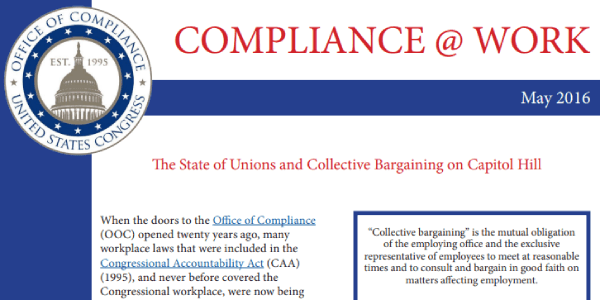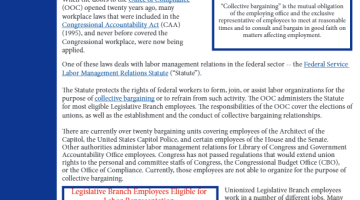When the doors to the Office of Compliance (OOC) opened twenty years ago, many workplace laws that were included in the Congressional Accountability Act (CAA) (1995), and never before covered the Congressional workplace, were now being applied.
“Collective bargaining” is the mutual obligation of the employing office and the exclusive representative of employees to meet at reasonable times and to consult and bargain in good faith on matters affecting employment.
One of these laws deals with labor management relations in the federal sector — the Federal Service Labor Management Relations Statute (“Statute”).
The Statute protects the rights of federal workers to form, join, or assist labor organizations for the purpose of collective bargaining or to refrain from such activity. The OOC administers the Statute for most eligible Legislative Branch employees. The responsibilities of the OOC cover the elections of unions, as well as the establishment and the conduct of collective bargaining relationships.
There are currently over twenty bargaining units covering employees of the Architect of the Capitol, the United States Capitol Police, and certain employees of the House and the Senate. Other authorities administer labor management relations for Library of Congress and Government Accountability Office employees. Congress has not passed regulations that would extend union rights to the personal and committee staffs of Congress, the Congressional Budget Office (CBO), or the Office of Compliance. Currently, those employees are not able to organize for the purpose of collective bargaining.
Unionized Legislative Branch employees work in a number of different jobs. Many police officers are represented by unions, as are masons, carpenters, freight and material handlers, guides and visitor assistants from the Capitol Visitor Center, and photographers and videographers from the House and Senate recording studios. Unions representing these and other employees for the purpose of collective bargaining include the American Federation of State, County, and Municipal Employees (AFSCME), the National Association of Broadcast Engineers and Technicians – Communication Workers of America (NABET-CWA), Teamsters, and the Fraternal Order of Police.

